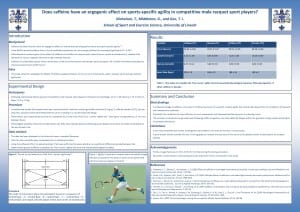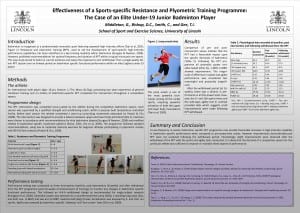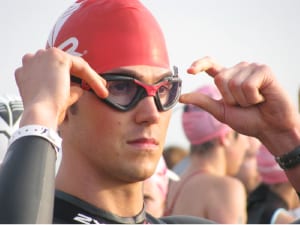 Research recently published within the journal of Physiology and Behaviour by PESP members Daniel Taylor and Dr Mark F Smith has revealed the physiological consequence of multi-sport activity, such as triathlon, on overall performance. This study examined how residual fatigue affects the relationship between ratings of perceived exertion (RPE), physiological responses, and pacing during triathlon performance. Findings indicated that our perception of effort, measured through our rating of perceived exertion appears to be a key pace regulator during multi-sport endurance performance and can be used to further examine what limits our endurance capability.
Research recently published within the journal of Physiology and Behaviour by PESP members Daniel Taylor and Dr Mark F Smith has revealed the physiological consequence of multi-sport activity, such as triathlon, on overall performance. This study examined how residual fatigue affects the relationship between ratings of perceived exertion (RPE), physiological responses, and pacing during triathlon performance. Findings indicated that our perception of effort, measured through our rating of perceived exertion appears to be a key pace regulator during multi-sport endurance performance and can be used to further examine what limits our endurance capability.
Author Archives: Ben
Our new swimming flume puts athletes through the paces
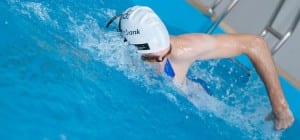 Researchers with the School of Sport and Exercise Science are putting athletes through the paces within their new swimming flume. Purchased to support research, teaching and consultancy activity, the PESP research team have already undertaken research using the flume to investigate the ole of pacing on triathlon. Lead researcher and PhD student Daniel Taylor has already published work within the journal Physiology and Behaviour, as well as presenting findings at the International Triathlon Conference in 2012 and 2013.
Researchers with the School of Sport and Exercise Science are putting athletes through the paces within their new swimming flume. Purchased to support research, teaching and consultancy activity, the PESP research team have already undertaken research using the flume to investigate the ole of pacing on triathlon. Lead researcher and PhD student Daniel Taylor has already published work within the journal Physiology and Behaviour, as well as presenting findings at the International Triathlon Conference in 2012 and 2013.
Can disease associated with inactive lifestyles be reduced?
The PESP research group are currently investigating how much the risk of disease associated with inactive lifestyles could be reduced if people exercised more at home.
 Given the rise of physical inactivity in the over-50s, scientists from the University of Lincoln’s School of Sport and Exercise Science are conducting a new programme of research to highlight the benefits of functional exercises that can be performed at home.
Given the rise of physical inactivity in the over-50s, scientists from the University of Lincoln’s School of Sport and Exercise Science are conducting a new programme of research to highlight the benefits of functional exercises that can be performed at home.
Led by Principal Lecturer Dr Mark F Smith, the team is now on the look-out for suitable volunteers who are keen to improve their health and fitness to take part in the study.
Dr Smith explained: “We are investigating the role of home-based resistance exercise on a large range of health factors such as microvascular and cardiovascular strength. We would like to hear from both males and females aged 50 and over who regard themselves as physically inactive, and have not purposefully engaged in planned sport or exercise on a regular basis for the past six-months.
“We already know that sedentary lifestyles can lead to increased risk of ill health, and with this new study we hope to add further insight into the benefit of home-based exercise on specific areas of fitness and wellbeing. By encouraging people to engage in exercise at home, we hope to show how beneficial it can be, without demanding the equipment, expense and time pressures often associated with sporting activities.”
The investigation builds upon an existing and evolving programme of research within the Lincoln School of Sport and Exercise Science. The School’s team of experts is undertaking a significant body of research to explore the role of moderate-intensity exercise interventions on vascular activity within sedentary older populations.
A first-phase research project funded through a University grant has already been published within the Clinical Sciences journal, and it is hoped that the outcomes of this new study will add to the growing understanding about the benefits of physical activity to overall health improvement.
PESP research showcased at the UKSCA national conference
Members from the PESP research group; Geoff Middleton and Dr Tom Gee, attended and presented two accepted research posters at the 2013 UK Strength and Conditioning Association Conference held at the East Midlands Conference Centre (31st Aug – 1st Sept). The posters were titled ‘The Implementation of a Sports-Specific Resistance and Plyometric Training Programme for an Elite Junior Badminton Player’ and ‘Does caffeine have an ergogenic effect on sports-specific agility in competitive male racquet sport players?’. Overall the conference provided a good mix of theoretical key note presentations from a global mix of leading strength and conditioning scientists and more applied breakout workshops delivered by world class practitioners.
A study into our perception of time
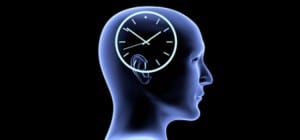 How well can you predict the passage of time? What about when you’re exercising? A study with the School of Sport and Exercise Science is currently investigating whether exercise intensity, that being light, moderate and hard, alters the way we perceive the passage of time. Theory suggests that as our physical sensations amass during physical exertion (e.g. temperature, acute discomfort, breathing rate etc…) our “emotional reservoir” begins to fill up. This has been proposed to alter our perception of the passage of time. Just think how your perception of time speeded up when you last watched a great film at the cinema? Or, how your perception of time slowed down when you were last waiting for a bus or train? The study aims, for the first time, to investigate whether as we exercise we are less accurate in estimating (i.e. forecasting) a pre-determined task end-point. That being, does our perception of time speed-up or slow-down when we place our bodies under strain?
How well can you predict the passage of time? What about when you’re exercising? A study with the School of Sport and Exercise Science is currently investigating whether exercise intensity, that being light, moderate and hard, alters the way we perceive the passage of time. Theory suggests that as our physical sensations amass during physical exertion (e.g. temperature, acute discomfort, breathing rate etc…) our “emotional reservoir” begins to fill up. This has been proposed to alter our perception of the passage of time. Just think how your perception of time speeded up when you last watched a great film at the cinema? Or, how your perception of time slowed down when you were last waiting for a bus or train? The study aims, for the first time, to investigate whether as we exercise we are less accurate in estimating (i.e. forecasting) a pre-determined task end-point. That being, does our perception of time speed-up or slow-down when we place our bodies under strain?





